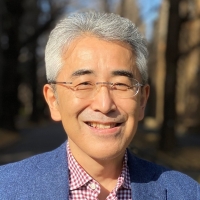About the lecturer
| I received my B.A. from Goshen College (1989) and Ph.D. in American Studies from the College of William and Mary (1999). I was also a Fulbright visiting scholar to U.C. Santa Cruz and the East-West Center (Honolulu). Of the course of my academic career, I have published and presented widely in Japanese and English on the intercultural dynamics of Japan-Pacific-US relations. My comments on contemporary US-Japan cultural issues have been quoted in major news media such as the New York Times, the Washington Post, CNN, BBC World Service and NHK World. | 
Prof. Yujin Yaguchi
|
Introduction video
Syllabus
| 1 | Subject | Writings About Japan: Analyzing Cultural Representations, From Orientalism to Artificial Intelligence |
| 2 | Field | Cultural Studies, East Asian Studies, History |
| 3 | Key words | representations, Orientalism, media, gender, power |
| 4 | Global Unit | 1 |
| 5 | Lecturer | Yujin Yaguchi |
| 6 | Period | June 15 - July 21, 2023 |
| 7 | Time | Students must attend one synchronous session from each of the following date brackets (=two sessions). Online discussion 1 June 19, 2023; 8:30 - 10:00am June 19, 2023; 5:00 - 6:30pm June 22, 2023; 8:30 - 10:00am June 22, 2023; 5:00 - 6:30pm Online discussion 2 July 17, 2023; 8:30 - 10:00am July 17, 2023; 5:00 - 6:30pm July 20, 2023; 8:30 - 10:00am July 20, 2023; 5:00 - 6:30pm Students can take On-demand contents any time during the course period. |
| 8 | Lecture style | On-demand |
| 9 | Evaluation Criteria | Excellent (S) 90 –100%; Very good (A) 80–89%; Good (B) 70–79%; Pass (C) 60–69%; Fail (D) 0–59% |
| 10 | Evaluation methods | Students will be required to participate in an online discussion based on certain themes designated by the instructor for each lesson. They must respond to each question in the online discussion forum. They must also attend and participate in at least one of each synchronous Online Discussions 1 and 2 for receiving a passing grade (see above for dates—note they are all Japan Standard Time). They will also be required to submit an 8-page (double spaced) paper based on the content of the course. Detailed instructions will be given to the registrants later. Online forum 40%; online synchronous discussion 25%; Final paper 35%. |
| 11 | Prerequisites | There is no prerequisite for the course. No prior knowledge is necessary, though students are encouraged to read some of the texts noted in the course content. Students must be willing to take an active interest in new and different ways of thinking about culture and its representations. |
| 12 | Contents |
Purpose (4) submit a 8-page (double spaced) paper based on the content of the course by August 4. Detailed instructions will be given after the registration. |
| 13 | Required readings | None. See, however, below for reference readings. |
| 14 | Reference readings | Students are strongly encouraged to read the books mentioned in the content section to gain a better appreciation of the lectures. In particular, the books by Benedict, Hershey, and Vogel are generally readily available, so it would be beneficial for them to take a look in advance. They are also encouraged to view the two films (Lost in Translation and Jiro Dreams of Sushi) and, if possible, other films that depict Japan. In addition, those who are interested in the cultural theory of representation should familiarize themselves with Edward Said's Orientalism, which will be discussed in the first lecture. |
| 15 | Notes on Taking the Course | This is an on-demand class that is NOT offered synchronously. There is no need, therefore, for the students to attend at a set time. The lectures and online forum will be available to registrants between June 15 and July 21. Students MUST, however, attend at least one live interactive synchronous session with the instructor during the times noted above. |
Contact
International Exchange Group, Education and Student Support Department,
The University of Tokyo, 7-3-1, Hongo, Bunkyo-ku, Tokyo 113-8652 JAPAN
Please send all inquiries regarding the courses to the following email address:
utokyo-guc.adm(at)gs.mail.u-tokyo.ac.jp *Please change (at) to @






